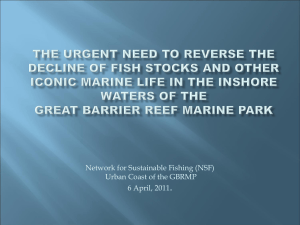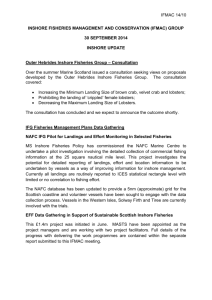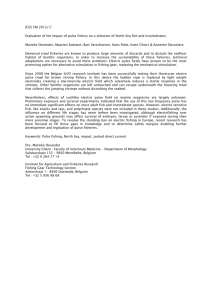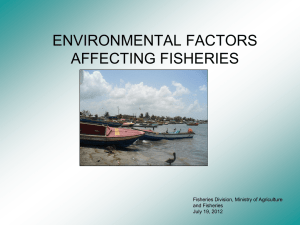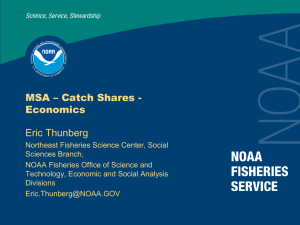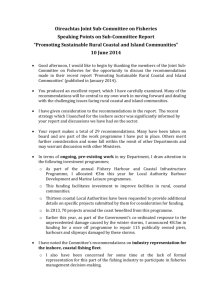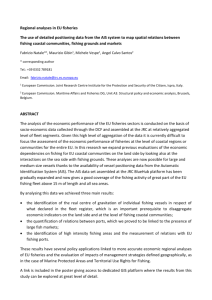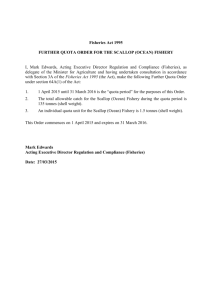David C Cook, B - Fishers For Conservation
advertisement
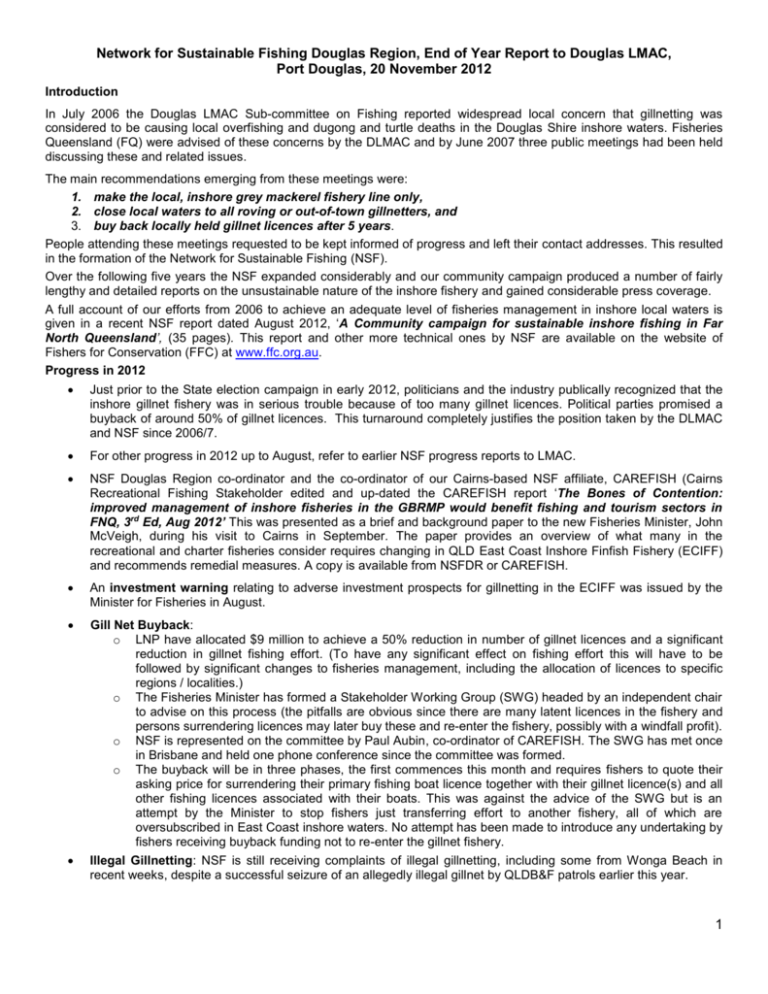
Network for Sustainable Fishing Douglas Region, End of Year Report to Douglas LMAC, Port Douglas, 20 November 2012 Introduction In July 2006 the Douglas LMAC Sub-committee on Fishing reported widespread local concern that gillnetting was considered to be causing local overfishing and dugong and turtle deaths in the Douglas Shire inshore waters. Fisheries Queensland (FQ) were advised of these concerns by the DLMAC and by June 2007 three public meetings had been held discussing these and related issues. The main recommendations emerging from these meetings were: 1. make the local, inshore grey mackerel fishery line only, 2. close local waters to all roving or out-of-town gillnetters, and 3. buy back locally held gillnet licences after 5 years. People attending these meetings requested to be kept informed of progress and left their contact addresses. This resulted in the formation of the Network for Sustainable Fishing (NSF). Over the following five years the NSF expanded considerably and our community campaign produced a number of fairly lengthy and detailed reports on the unsustainable nature of the inshore fishery and gained considerable press coverage. A full account of our efforts from 2006 to achieve an adequate level of fisheries management in inshore local waters is given in a recent NSF report dated August 2012, ‘A Community campaign for sustainable inshore fishing in Far North Queensland’, (35 pages). This report and other more technical ones by NSF are available on the website of Fishers for Conservation (FFC) at www.ffc.org.au. Progress in 2012 Just prior to the State election campaign in early 2012, politicians and the industry publically recognized that the inshore gillnet fishery was in serious trouble because of too many gillnet licences. Political parties promised a buyback of around 50% of gillnet licences. This turnaround completely justifies the position taken by the DLMAC and NSF since 2006/7. For other progress in 2012 up to August, refer to earlier NSF progress reports to LMAC. NSF Douglas Region co-ordinator and the co-ordinator of our Cairns-based NSF affiliate, CAREFISH (Cairns Recreational Fishing Stakeholder edited and up-dated the CAREFISH report ‘The Bones of Contention: improved management of inshore fisheries in the GBRMP would benefit fishing and tourism sectors in FNQ, 3rd Ed, Aug 2012’ This was presented as a brief and background paper to the new Fisheries Minister, John McVeigh, during his visit to Cairns in September. The paper provides an overview of what many in the recreational and charter fisheries consider requires changing in QLD East Coast Inshore Finfish Fishery (ECIFF) and recommends remedial measures. A copy is available from NSFDR or CAREFISH. An investment warning relating to adverse investment prospects for gillnetting in the ECIFF was issued by the Minister for Fisheries in August. Gill Net Buyback: o LNP have allocated $9 million to achieve a 50% reduction in number of gillnet licences and a significant reduction in gillnet fishing effort. (To have any significant effect on fishing effort this will have to be followed by significant changes to fisheries management, including the allocation of licences to specific regions / localities.) o The Fisheries Minister has formed a Stakeholder Working Group (SWG) headed by an independent chair to advise on this process (the pitfalls are obvious since there are many latent licences in the fishery and persons surrendering licences may later buy these and re-enter the fishery, possibly with a windfall profit). o NSF is represented on the committee by Paul Aubin, co-ordinator of CAREFISH. The SWG has met once in Brisbane and held one phone conference since the committee was formed. o The buyback will be in three phases, the first commences this month and requires fishers to quote their asking price for surrendering their primary fishing boat licence together with their gillnet licence(s) and all other fishing licences associated with their boats. This was against the advice of the SWG but is an attempt by the Minister to stop fishers just transferring effort to another fishery, all of which are oversubscribed in East Coast inshore waters. No attempt has been made to introduce any undertaking by fishers receiving buyback funding not to re-enter the gillnet fishery. Illegal Gillnetting: NSF is still receiving complaints of illegal gillnetting, including some from Wonga Beach in recent weeks, despite a successful seizure of an allegedly illegal gillnet by QLDB&F patrols earlier this year. 1 Bag Limits for Indigenous Fishers: Clarification is still pending from FQ as to the conditions under which indigenous persons may or may not exceed the recreational bag limit when fishing for grey mackerel. Government spending cuts hit Fisheries Qld: There is some good news and some bad here. Personnel changes have seen certain senior FQ staff, who appeared most resistant to accepting the need for change in the gillnet fishery and accepting the concept and implications of multiple stocks of grey mackerel along the East Coast, moved to non-resource management positions. Regrettably the observer programme on the gillnet fishery has been suspended and management effort in recreational fisheries has been reduced. Boat Registration and Recreational User Funds (RUF): Controversy here: about $4.6 million is collected annually as an additional RUF levvy on the annual registration fee for recreational boats. This was introduced years back to fund improvements to recreational fishing. There is disagreement between recreational fishers and government as to whether this is being used as originally intended or hijacked to fund core FQ business. Reef & Offshore Fisheries It has been the practice of NSFDR to deal only with matters relating to inshore waters and not the reef, trawl or distant water fisheries. However the two following topics deserve mention. Request for extension to live coral trout fishing closures: some commercial trout fishers are noting steep declines in coral trout numbers and are calling for a three month closure over the spawning period. They consider this should replace the two, four-day closures which they regard as incapable of providing sufficient protection to stop the noted ongoing severe decline of coral trout. Declaration of the Coral Sea Marine Park: whereas there is support for the closure of offshore islands and small offshore sea mounds to fishing, many NSF members are concerned that fishers are being locked out of much of the pelagic fish resources of the Coral Sea. Access to sustainable pelagic fisheries may be heavily restricted and some pelagic fisheries forced to close for no clear reasons. Many NSF members hold the view that it is better to have a well-managed Australian fishery acting as eyes and ears to detect foreign vessels rather than to leave a vacuum which may be filled by illegal foreign fishing. Extensive offshore green zones will require expensive recurrent expenditure on surveillance and enforcement which governments may soon be reluctant to fund. Illegal fishers may catch far more than the current local small and apparently well-managed pelagic fishery. The need for Assessment of the ECIFF under the Marine Stewardship Council NSFDR commends the lengths to which the dive and sailing tourism sectors working the FNQ section of the GBRMP have gone to ensure minimal impact on resources. I congratulate one particular Port Douglas operator for recently achieving major awards for reaching carbon neutral status. Is it not time that the public insists that commercial fishing in the marine park be independently assessed for sustainability? Until March 2012 it was politically expedient for government to insist ECIFF gillnetting was sustainable, despite a relatively damning assessment under the EPBC Act by Gunn, Meere and Stevens in 2008 for Federal Environment Minister, Peter Garrett. The follow-up assessment by government staff in 2011/12 is considered by many to have been inadequate and virtually a cover-up because remedial action recommended in 2008 has still not been fully and effectively implemented. A simple reduction in gillnet licences by the present buyback may well be insufficient to prevent continuing decline of inshore stocks and the elimination of some local fish populations. There is a real need to protect local fish stocks for future times when oil prices prohibit many present day practices. Communities need to ensure local stocks of vulnerable inshore species such as threadfin, grey mackerel, fingermark and probably several other species are not wiped out by part-time or over-efficient netters. The answer to all this is to have the ECIFF independently assessed under the international Marine Stewardship Process by an accredited MSC assessor. The MSC process is in use worldwide and widely respected as the catalyst resulting in management intervention to help save a number of fisheries. Key supermarket chains have refused to deal with product from fisheries that failed sustainability certification. This demanded fisheries management intervention to address the concerns raised by MSC. A short film on the MSC process in Australia can be seen on: http://www.msc.org/newsroom/video/msc-sustainablefishing-communities-australia. Further information is available on http://www.msc.org/documents/msc-brochures and elsewhere on their website. Let’s make it an aim of the Douglas LMAC in 2013 to push for assessment of the ECIFF under the much acclaimed MSC Process. David Cook Co-ordinator, Network for Sustainable Fishing Douglas Region "taking a community approach" For more about our need for better fisheries management to reverse the decline of our inshore fish stocks, see: www.ffc.org.au. 2

